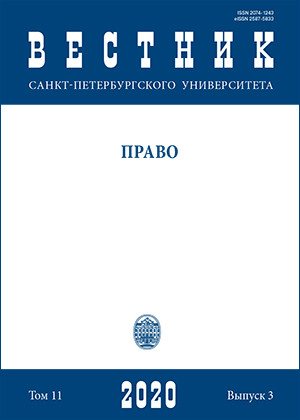Chinese-Russian mechanism of the high-level judicial cooperation
DOI:
https://doi.org/10.21638/spbu14.2020.316Abstract
In the past 70 years, Chinese-Russian relations have reached an unprecedentedly high level. The People’s Republic of China and the Russian Federation, in the spirit of neighborliness, friendship, and cooperation, are developing comprehensive partnership and strategic cooperation in this new era to raise bilateral relations to a new and higher level. The high-level interaction mechanisms established between Russia and China have played a crucial role in achieving new ambitious goals and long-term benchmarks for cooperation. Judicial cooperation has broad development prospects as an important guarantee for interaction in areas that are truly important for both countries. The strengthening of judicial cooperation between Russia and China, on the one hand, promotes the conjunction and adaptation of various institutional arrangements involving mutual trade, investment, and economic cooperation, such as trade and investment rules, technical standards, and legal bases between countries. Cooperation also provides a basis for the development of relevant uniform rules. On the other hand, it also helps to improve the level of foreign-related legal services, including lawyers, notaries and mediation, to ensure the free flow of various elements between different economies, to help small and medium-sized enterprises operate in full compliance with the law and resolve disputes. In order to serve the needs of participants in international trade between Russia and China, promote the policy of the Eurasian Economic Union (EAEU) and the construction of the “Silk Road Economic Belt”, it is possible to improve the level of special foreign-related legal services, create legal service platforms, build an experienced international legal services team, and establish one more mechanism of judicial cooperation under the unique, effective mechanism of regular meetings between the heads of the Russian and Chinese governments.
Keywords:
China, Russia, legal cooperation, mechanisms of legal cooperation, training of legal personnel, Russian-Chinese relations
Downloads
References
Downloads
Published
How to Cite
Issue
Section
License
Articles of "Vestnik of Saint Petersburg University. Law" are open access distributed under the terms of the License Agreement with Saint Petersburg State University, which permits to the authors unrestricted distribution and self-archiving free of charge.






